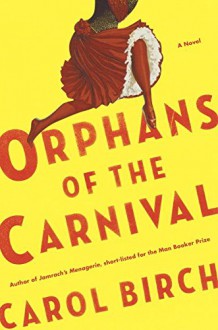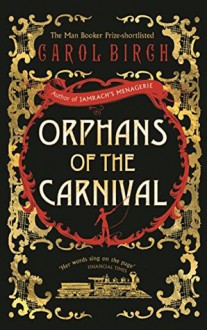
Thanks to NetGalley and to Canongate book for providing me with a copy of this novel in exchange for an honest review.
Although I’ve never been to a circus I’ve always been interested in stories, books, films and artworks about the circus. And I’ve never forgotten the movie Freaks (1932) directed by Tod Browning, that is as beautiful and touching as it is horrifying (not because of the ‘freaks’ of the story, but because of the way they were exhibited and exploited) , since I first saw it many years back. Human beings have always been fascinated by the unknown and by those who are similar but different to us (not only from a different country and race, but sometimes truly different, something that Freud tried to explain when he defined the ‘uncanny’ as something that is familiar and strange at once (https://en.wikipedia.org/wiki/Uncanny) and can cause attraction and repulsion at the same time.
This is the first novel by Carol Birch that I read, and although I was interested in her literary career, what made me pick it up was the subject matter. The author writes about Julia Pastrana, a woman born in Mexico in 1834 with two severe genetic malformations that resulted in her body being covered in hair and in her having a protruding mouth and lips with two rows of teeth. There circulated strange stories about her origin (still available nowadays), and she was spotted in a Mexican house by somebody in showbiz and ended up in the circus and carnival circuits, first in the US and then throughout most of Europe. The novel tells her re-imagined story, although, as the writer explains at the end, she used the basic known facts of her life as scaffolding that allowed her to fill in the gaps and create a fictionalised account of her short but intense life.
Julia’s story is interspersed in the novel with some chapters about Rose, a woman of our time (or thereabouts) who lives in a small apartment in London and who is could be defined as a hoarder. But more than a hoarder, she seems to feel an affinity for the objects she finds, no matter how broken and tatty, as if their stories called to her and she feels she has to rescue them and give them a home. When she finds a strange and half-destroyed doll at the beginning of the novel we don’t know yet what the link with Julia is. We don’t find that out until the very end (or close enough, although I missed one of the clues, so intent I was on following Julia’s story at that point) and it’s sad but somehow it offers a sense of closure. The mention of the island of the Dolls that also exist in reality adds another layer of strangeness and creepiness (or enchantment, it depends on one’s point of view) to the story.
The book is written in the third person from the various main characters’ points of view. The historical account is mostly from Julia’s point of view (and giving her a voice, after so many years of being the object of the gaze is a great decision), although later when she meets Lent the points of view alternate between the two and I feel that the author makes a good job of trying to get into the mind of her husband, a man difficult to empathise with or understand, especially from a modern point of view (although I’m sure people at the time wouldn’t have been comfortable with his behaviour either, at least the most enlightened ones). Rose’s chapters, although far less numerous, are told from her point of view and later from Adams’s, a neighbour, friend and lover. The novel is beautifully written; it does not only manage to create a sense of place and of the historical period, but it also succeeds at building up a psychologically consistent portrayal of both Julia and her husband. I felt there was far less detail about the contemporary parts of the story and although I did appreciate the eventual confluence of plots (so to speak, but I’ll avoid giving away any spoilers), I’m not sure that the two parts fit perfectly well, enhance each other rather than distract from one another, or that we get to know or understand the contemporary characters other than superficially. To be fair to the author, I can’t imagine many fictional stories that could compete with Julia’s real life (and afterlife).
This is a book where those who are deemed less than human run rings around the self-professed echelons of society, and I’m sure I’ll keep thinking about this story that touches on colonialism, misogyny, exploitation, issues of race, disability, diversity… Yes, I felt compelled to check the story of Julia Pastrana and other than some discrepancy about the date of her marriage, the novel is accurate regarding the facts, proving the adage that reality is stranger than fiction. And history for sure.
This is a book that will interest people who enjoy Victoriana and historical fiction of the era, and anybody who likes to read a well-written novel with great characters. It is a sad story (and I cried more than once) but it deserves to be told and read. Perhaps we don’t have carnivals or shows of the style described in the book any longer, but we shouldn’t be complacent because we are not as enlightened as we might like to think. A fascinating novel about a fascinating human being and the society of her time.


 Log in with Facebook
Log in with Facebook 






